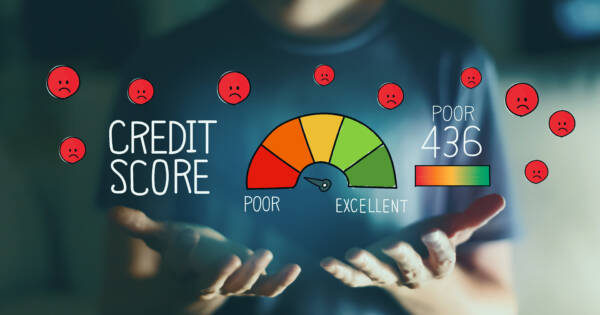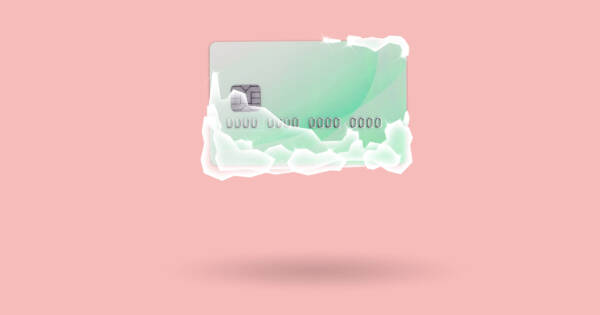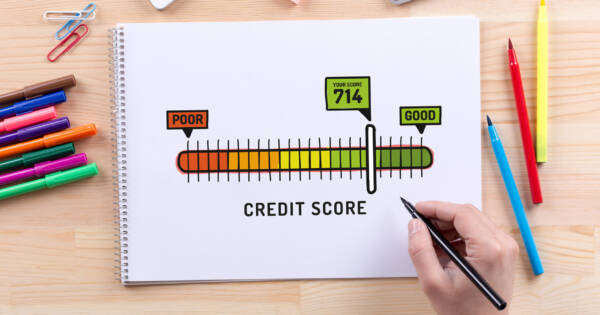Although most adults have a credit report and score, few check them regularly — and many aren’t sure what their reports actually say about their financial habits or future. Some people mistakenly believe that every late payment or old debt stays on a report forever. Fortunately, that’s not true. Most negative items expire after a set period, while some positive ones last longer. If you’ve ever wondered how long information sticks around, here’s what you need to know.
The Seven Year Rule
In most cases, items that negatively impact a credit score remain on your report for six years. The Fair Credit Reporting Act, which is a federal statute, defines how long certain information may legally remain on a credit report. With a few notable exceptions, the standard is seven years.
As you’ll read about a bit later in the article, positive items (that can lift a credit score) typically remain in place for ten years. That’s good news, since they can help offset (and even outlast) any blemishes on your credit report. Here’s a short rundown of the negative items that will stick around on your credit report for seven years.
Late or Missed Payments
The good news is that most payments have a 30-day grace period before they turn into a black mark. Most companies are understanding if you are infrequently a day or two late. Maybe you were waiting for your paycheck to arrive or a banking hiccup delayed the payment. That’s no big deal, as long as it doesn’t happen too often.
However, if a due payment is more than 30 days late, it will show up on your credit report. And it will stay there for seven years, even if you already made sure to square up the debt. When you look at your credit report, this may appear as a mention that “one or more of your accounts was 30, 60, 90, 120, 150, or 180 days past due.” Obviously, the later the payment was delayed, the worse your credit score will be.
Collection Accounts
Late payments are bad enough, especially if you have a bunch of them. However, not paying at all is even worse. If you refuse to pay whatever bills you owe, there’s a good chance those debts will get passed along to a collection agency. That means the service provider (like a cell phone company, for example) simply sells your debt to a third-party (likely at a discount). Then the collection agency attempts to get the payments from you instead.
Even if you settle with the collection agency, it’s too late. That black mark on your credit will remain in place for seven years. Having any of your debts go into collections will cause your credit score to dramatically drop. For this reason, you should make every attempt to settle bills directly with the company who issued them — even if you’re struggling financially. Some of them will be happy to work out a payment plan with you. However, simply ignoring the bills and having them end up in collections is always a bad move.
Charge-Offs
A charge-off is when a lender closes off an account because they don’t believe that you can continue to service the debt. This is likely to happen with products like a credit card, line of credit, or even a monthly billed service like cable TV or home internet. While you’ll lose access to using the product itself, you’re still liable for the debt.
Charge-offs are a serious negative mark on your credit report. They stick around for seven years and can seriously harm your score. If you ignore a charge-off for too long, it will probably also end up in collections (see above). Even worse, a charge-off is a sign that companies have completely lost faith in your ability to pay your bills. When one company does it, others are likely to soon follow.
Bankruptcy (Chapter 13)
Few things are as damaging to a credit report as a bankruptcy filing. With a Chapter 13 bankruptcy, borrowers who have a stable source of income agree to a repayment plan set by a lender. It usually pays off a substantial portion of any outstanding debt within three-to-five years. After that, the remaining balance may be discharged. This type of bankruptcy remains on a credit report for seven years.
A Chapter 11 bankruptcy is a similar process, although it’s normally reserved for companies as opposed to individuals. There’s also a Chapter Seven bankruptcy, which is even worse for your credit score. We’ll discuss that more in our next section. Regardless, you should consider filing for any type of bankruptcy as a last resort.
What Stays on Your Credit Report Even Longer?
Some things will stay on your credit report even longer than seven years. While this can include extremely damaging financial records, there’s also the option for positive things to stay on your credit report for longer too. Here’s the breakdown.
Chapter Seven Bankruptcy (10 years)
A Chapter 7 bankruptcy is often referred to as a straightforward bankruptcy. Unlike the other types, which offer a chance to restructure your debt and create a workable payment plan, a Chapter 7 is an attempt to escape your debt entirely by claiming insolvency. Since there is no repayment plan involved, the credit agencies obviously view Chapter Seven even less favorably than Chapter 13.
Again, any type of bankruptcy should be your very last resort, financially. A Chapter 7 will haunt your credit report for ten years. Considering your credit score only really matters between the time you are 18-year-old and your retirement (or death), ten years is a huge percentage of that time.
Open Accounts In Good Standing (Indefinitely)
Now for some good news. Not everything on your credit report has to be a bad thing. There are various items that can have a positive impact in your score too. For example, open accounts on revolving credit products — that is credit cards and lines of credits. If you have these products, use them responsibly, and always make your payments, they will remain on your credit report indefinitely. You just have to keep the account open and active.
Having some credit accounts in good standing can work wonders for your credit score. It shows you have a long history of being responsible with your credit. Since your credit history is major component of your credit score, keeping these good standing accounts on your credit report should always be a priority.
Closed Accounts In Good Standing (10 years)
Even if you do have to close one of your revolving credit accounts, all is not lost. Closed accounts in good standing will also typically stay in your credit report for 10 years. That gives you plenty of extra benefit after you’re done with that credit card or line of credit. These closed accounts can help counteract any other blemishes on your report too.
Even though these accounts stay on your credit report for a decade, they will eventually drop off. This is why many financial experts recommend you never cancel that old credit card. Even if you upgrade to one with better rewards, a lower interest rate, or high credit limit, it usually helps your credit score to simply leave the account open. It positively adds to your credit history and your credit utilization numbers.
Hard and Soft Credit Inquiries
You’ve probably heard the terms “soft pull” or “hard pull” before. Sometimes they are called “hard hits” or “hard inquiries” too. No matter what they are called, your credit score is impacted when companies request your credit details. Whether it’s applying for a new credit card, applying for a car loan, or getting a mortgage, all of these require a company to “pull your credit.” That pull itself becomes a piece of data on your credit score.
The good news is that these pulls don’t usually have a huge impact on your credit score. A “soft pull” is normally the result of a background check or a pre-approval process. These don’t affect your credit score at all. Even a hard pull is only likely to remain on your credit report for a year or two, at most. These credit inquiries are actually considered neutral events. While a single hard pull might see your credit score drop temporarily, it will bounce back in a few weeks.
Repeated Credit Inquiries (or Credit Checks)
The only real danger of these credit inquiries is if you make too many of them, too quickly. A spree of credit inquiries on your report in a short period of time will be a huge red flag to the credit agencies. They will assume it means you are in desperate need of borrowing money for some reason, which is hardly ever a good sign.
On the other hand, there is typically a window of opportunity to shop around. If you meet with several different lenders about needing a car loan, for example, they may all pull your credit to determine what terms or interest rate you qualify for. The good news is that credit agencies will group multiple hard pulls together, as long as they were done within a few weeks (typically 15 or 30 days). The multiple hard inquiries will only count as a single pull.
How To Help Your Credit Score
And now another piece of good news. You can take multiple steps to improve your credit score. Yes, simply using your credit responsibly is the biggest step. Beyond that, however, there are multiple ways you can actively improve your score. We won’t list them all here, but we have multiple articles dedicated solely to helping readers improve their credit score.
Since this article is about how long things stay on your credit score, we will discuss this one extra tip though. If there’s a black mark on your credit report, for whatever reason, you might be able to remove it early by… simply asking. Yes, it could actually be that simple. Let’s say your credit is otherwise pretty good, but you have an old delinquent account or missed payment (that you’ve paid off since) hanging around. You should send the credit agencies (or relevant company) a “goodwill letter.” Just explain that you were going through some financial hardship at the time, but you’ve taken steps to fix your money issues. Then politely request that they remove the blemish as an act of good faith. While there’s no guarantee they will do it, it never hurts to ask!
The Bottom Line
It’s not clear how quickly good behavior improves a credit score, but the penalty for most negative events fades within a few years. The exception is a bankruptcy filing, which can negatively impact a credit score until it is finally off the books for good after seven or 10 years. Given the sensitive nature of the information included in a credit report, it is advisable to check your report and score with one of the three main U.S. credit agencies – Equifax, Experian and TransUnion – at least once a year.
If you find some old black marks on your credit report that you feel should be removed, consider sending what’s called a “goodwill letter” to the relevant credit agency requesting that they remove the item(s) in question. There’s no guarantee that the credit agency will agree with you and remove the requested item, but it doesn’t hurt to ask. In some instances, you may also be able to plead “financial hardship” to a credit agency if you have lost your job or been negatively impacted by events beyond your control, such as the global Covid-19 pandemic. Again, there’s no way to know how the credit agency will respond, but it is always good to be an advocate for yourself.








